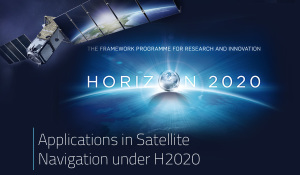The second Horizon 2020 (H2020) call for Applications in Satellite Navigation, managed by the European GNSS Agency, is officially open. With a budget of EUR 25 million for the 2015 call, the deadline for submitting proposals is 8 April 2015.
To accelerate EU space policy, the second Horizon 2020 call focuses on growth and impact across all market segments, including transport (road, rail, maritime, aviation), high precision surveying, location based services (LBS), agriculture and emergency services. Priority is also placed on raising productivity and competitiveness while reducing adverse environmental impact
Space research is fundamental to ensuring that EU space policy continues to provide cutting-edge solutions to everyday societal problems. It also benefits EU citizens and ensures that Europe remains competitive in space activities.
Horizon 2020, as the biggest EU Framework Program for Research and Innovation, targets the development of new space enabled applications in different focus areas such as health, citizen safety, mobility, smart cities, sustainable resources monitoring and management, regional growth, low-carbon energy infrastructure planning and protection, and disaster management and climate control, including natural catastrophes.
Last year’s first call of H2020-Galileo received 109 proposals from 775 applicants. Applications were evaluated at the GSA’s headquarters in Prague on the basis of excellence, impact, quality, and efficiency of implementation. After the evaluation, 25 proposals were invited for the grant agreement preparation phase and two were placed on the reserve list.
What is H2020?
Horizon 2020 is the European Union’s next programme for research and innovation, with a focus on securing Europe’s global competitiveness. The projects coming from the second call in Applications in Satellite Navigation will be managed by the European GNSS Agency (GSA) under the Delegation Agreement with the Commission.
How to apply
Applications should promote innovation, demonstrate a clear advantage of using Galileo and EGNOS, and include synergies with other GNSSs. Proposals should aim at the definition and implementation of pilot projects and development of those EGNSS-enabled applications that are close to the market and driven by user requirements with a high societal benefit and a potential to eventually set common standards in the field of GNSS applications. The proposal should have a clear intention and rationale to commercialise the products and services developed, including a business plan.
H2020-Galileo-2015-1 Call opened on 4th of November 2014 and the final and complete form of proposals must be submitted by 8th of April 2015, 17:00:00 (Brussels local time). For information related to eligibility and admissibility conditions, submission and evaluation process, rules for funding, guide manuals, templates, etc., please visit the official European Commission’s Participant Portal.
For more information, you are welcome to attend the workshop on European GNSS Applications in Horizon 2020 for the 2nd call in Prague on 14 January 2015.

